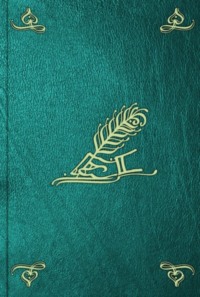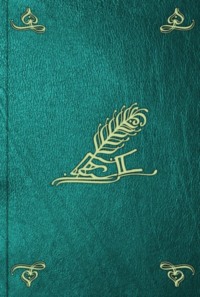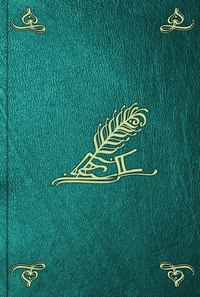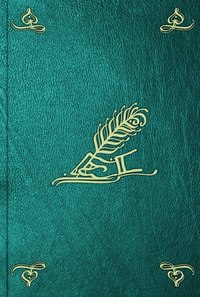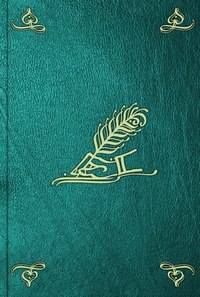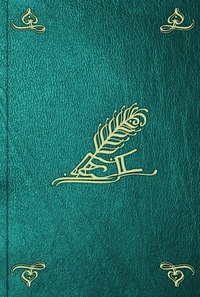 полная версия
полная версияCharles Darwin: His Life Told in an Autobiographical Chapter, and in a Selected Series of His Published Letters
I am very sorry to hear about Falconer's "reclamation."228 I hate the very word, and have a sincere affection for him.
Did you ever read anything so wretched as the Athenæum reviews of you, and of Huxley229 especially. Your object to make man old, and Huxley's object to degrade him. The wretched writer has not a glimpse of what the discovery of scientific truth means. How splendid some pages are in Huxley, but I fear the book will not be popular…
In the Athenæum, Mar. 28, 1862, p. 417, appeared a notice of Dr. Carpenter's book on 'Foraminifera,' which led to more skirmishing in the same journal. The article was remarkable for upholding spontaneous generation.
My father wrote, Mar. 29, 1863: —
"Many thanks for Athenæum, received this morning, and to be returned to-morrow morning. Who would have ever thought of the old stupid Athenæum taking to Oken-like transcendental philosophy written in Owenian style!
"It will be some time before we see 'slime, protoplasm, &c.' generating a new animal. But I have long regretted that I truckled to public opinion, and used the Pentateuchal term of creation,230 by which I really meant 'appeared' by some wholly unknown process. It is mere rubbish, thinking at present of the origin of life; one might as well think of the origin of matter."
The Athenæum continued to be a scientific battle-ground. On April 4, 1863, Falconer wrote a severe article on Lyell. And my father wrote (Athenæum, 1863, p. 554), under the cloak of attacking spontaneous generation, to defend Evolution. In reply, an article appeared in the same Journal (May 2nd, 1863, p. 586), accusing my father of claiming for his views the exclusive merit of "connecting by an intelligible thread of reasoning" a number of facts in morphology, &c. The writer remarks that, "The different generalisations cited by Mr. Darwin as being connected by an intelligible thread of reasoning exclusively through his attempt to explain specific transmutation are in fact related to it in this wise, that they have prepared the minds of naturalists for a better reception of such attempts to explain the way of the origin of species from species."
To this my father replied as follows in the Athenæum of May 9th, 1863: —
Down, May 5 [1863].I hope that you will grant me space to own that your reviewer is quite correct when he states that any theory of descent will connect, "by an intelligible thread of reasoning," the several generalizations before specified. I ought to have made this admission expressly; with the reservation, however, that, as far as I can judge, no theory so well explains or connects these several generalizations (more especially the formation of domestic races in comparison with natural species, the principles of classification, embryonic resemblance, &c.) as the theory, or hypothesis, or guess, if the reviewer so likes to call it, of Natural Selection. Nor has any other satisfactory explanation been ever offered of the almost perfect adaptation of all organic beings to each other, and to their physical conditions of life. Whether the naturalist believes in the views given by Lamarck, by Geoffroy St. Hilaire, by the author of the Vestiges, by Mr. Wallace and myself, or in any other such view, signifies extremely little in comparison with the admission that species have descended from other species, and have not been created immutable; for he who admits this as a great truth has a wide field opened to him for further inquiry. I believe, however, from what I see of the progress of opinion on the Continent, and in this country, that the theory of Natural Selection will ultimately be adopted, with, no doubt, many subordinate modifications and improvements.
Charles Darwin.In the following, he refers to the above letter to the Athenæum: —
C. D. to J. D. Hooker. Saturday [May 11, 1863]My dear Hooker, – You give good advice about not writing in newspapers; I have been gnashing my teeth at my own folly; and this not caused by – 's sneers, which were so good that I almost enjoyed them. I have written once again to own to a certain extent of truth in what he says, and then if I am ever such a fool again, have no mercy on me. I have read the squib in Public Opinion;231 it is capital; if there is more, and you have a copy, do lend it. It shows well that a scientific man had better be trampled in dirt than squabble.
In the following year (1864) he received the greatest honour which a scientific man can receive in this country, the Copley Medal of the Royal Society. It is presented at the Anniversary Meeting on St. Andrew's Day (Nov. 30), the medallist being usually present to receive it, but this the state of my father's health prevented. He wrote to Mr. Fox: —
"I was glad to see your hand-writing. The Copley, being open to all sciences and all the world, is reckoned a great honour; but excepting from several kind letters, such things make little difference to me. It shows, however, that Natural Selection is making some progress in this country, and that pleases me. The subject, however, is safe in foreign lands."
The presentation of the Copley Medal is of interest in connection with what has gone before, inasmuch as it led to Sir C. Lyell making, in his after-dinner speech, a "confession of faith as to the Origin." He wrote to my father (Life of Sir C. Lyell, vol. ii. p. 384), "I said I had been forced to give up my old faith without thoroughly seeing my way to a new one. But I think you would have been satisfied with the length I went."
Lyell's acceptance of Evolution was made public in the tenth edition of the Principles, published in 1867 and 1868. It was a sign of improvement, "a great triumph," as my father called it, that an evolutionary article by Wallace, dealing with Lyell's book, should have appeared in the Quarterly Review (April, 1869). Mr. Wallace wrote: —
"The history of science hardly presents so striking an instance of youthfulness of mind in advanced life as is shown by this abandonment of opinions so long held and so powerfully advocated; and if we bear in mind the extreme caution, combined with the ardent love of truth which characterise every work which our author has produced, we shall be convinced that so great a change was not decided on without long and anxious deliberation, and that the views now adopted must indeed be supported by arguments of overwhelming force. If for no other reason than that Sir Charles Lyell in his tenth edition has adopted it, the theory of Mr. Darwin deserves an attentive and respectful consideration from every earnest seeker after truth."
The incident of the Copley Medal is interesting as giving an index of the state of the scientific mind at the time.
My father wrote: "some of the old members of the Royal are quite shocked at my having the Copley." In the Reader, December 3, 1864, General Sabine's presidential address at the Anniversary Meeting is reported at some length. Special weight was laid on my father's work in Geology, Zoology, and Botany, but the Origin of Species was praised chiefly as containing a "mass of observations," &c. It is curious that as in the case of his election to the French Institute, so in this case, he was honoured not for the great work of his life, but for his less important work in special lines.
I believe I am right in saying that no little dissatisfaction at the President's manner of allusion to the Origin was felt by some Fellows of the Society.
My father spoke justly when he said that the subject was "safe in foreign lands." In telling Lyell of the progress of opinion, he wrote (March, 1863): —
"A first-rate German naturalist232 (I now forget the name!), who has lately published a grand folio, has spoken out to the utmost extent on the Origin. De Candolle, in a very good paper on 'Oaks,' goes, in Asa Gray's opinion, as far as he himself does; but De Candolle, in writing to me, says we, 'we think this and that;' so that I infer he really goes to the full extent with me, and tells me of a French good botanical palæontologist233 (name forgotten), who writes to De Candolle that he is sure that my views will ultimately prevail. But I did not intend to have written all this. It satisfies me with the final results, but this result, I begin to see, will take two or three life-times. The entomologists are enough to keep the subject back for half a century."
The official attitude of French science was not very hopeful. The Secrétaire Perpétuel of the Académie published an Examen du livre de M. Darwin, on which my father remarks: —
"A great gun, Flourens, has written a little dull book234 against me, which pleases me much, for it is plain that our good work is spreading in France."
Mr. Huxley, who reviewed the book,235 quotes the following passage from Flourens: —
"M. Darwin continue: Aucune distinction absolue n'a été et ne peut être établie entre les espèces et les variétés! Je vous ai déjà dit que vous vous trompiez; une distinction absolue sépare les variétés d'avec les espèces." Mr. Huxley remarks on this, "Being devoid of the blessings of an Academy in England, we are unaccustomed to see our ablest men treated in this way even by a Perpetual Secretary." After demonstrating M. Flourens' misapprehension of Natural Selection, Mr. Huxley says, "How one knows it all by heart, and with what relief one reads at p. 65, 'Je laisse M. Darwin.'"
The deterrent effect of the Académie on the spread of Evolution in France has been most striking. Even at the present day a member of the Institute does not feel quite happy in owning to a belief in Darwinism. We may indeed be thankful that we are "devoid of such a blessing."
Among the Germans, he was fast gaining supporters. In 1865 he began a correspondence with the distinguished Naturalist, Fritz Müller, then, as now, resident in Brazil. They never met, but the correspondence with Müller, which continued to the close of my father's life, was a source of very great pleasure to him. My impression is that of all his unseen friends Fritz Müller was the one for whom he had the strongest regard. Fritz Müller is the brother of another distinguished man, the late Hermann Müller, the author of Die Befruchtung der Blumen (The Fertilisation of Flowers), and of much other valuable work.
The occasion of writing to Fritz Müller was the latter's book, Für Darwin, which was afterwards translated by Mr. Dallas at my father's suggestion, under the title Facts and Arguments for Darwin.
Shortly afterwards, in 1866, began his connection with Professor Victor Carus, of Leipzig, who undertook the translation of the 4th edition of the Origin. From this time forward Professor Carus continued to translate my father's books into German. The conscientious care with which this work was done was of material service, and I well remember the admiration (mingled with a tinge of vexation at his own shortcomings) with which my father used to receive the lists of oversights, &c., which Professor Carus discovered in the course of translation. The connection was not a mere business one, but was cemented by warm feelings of regard on both sides.
About this time, too, he came in contact with Professor Ernst Haeckel, whose influence on German science has been so powerful.
The earliest letter which I have seen from my father to Professor Haeckel, was written in 1865, and from that time forward they corresponded (though not, I think, with any regularity) up to the end of my father's life. His friendship with Haeckel was not merely the growth of correspondence, as was the case with some others, for instance, Fritz Müller. Haeckel paid more than one visit to Down, and these were thoroughly enjoyed by my father. The following letter will serve to show the strong feeling of regard which he entertained for his correspondent – a feeling which I have often heard him emphatically express, and which was warmly returned. The book referred to is Haeckel's Generelle Morphologie, published in 1866, a copy of which my father received from the author in January, 1867.
Dr. E. Krause236 has given a good account of Professor Haeckel's services in the cause of Evolution. After speaking of the lukewarm reception which the Origin met with in Germany on its first publication, he goes on to describe the first adherents of the new faith as more or less popular writers, not especially likely to advance its acceptance with the professorial or purely scientific world. And he claims for Haeckel that it was his advocacy of Evolution in his Radiolaria (1862), and at the "Versammlung" of Naturalists at Stettin in 1863, that placed the Darwinian question for the first time publicly before the forum of German science, and his enthusiastic propagandism that chiefly contributed to its success.
Mr. Huxley, writing in 1869, paid a high tribute to Professor Haeckel as the Coryphæus of the Darwinian movement in Germany. Of his Generelle Morphologie, "an attempt to work out the practical applications" of the doctrine of Evolution to their final results, he says that it has the "force and suggestiveness, and … systematising power of Oken without his extravagance." Mr. Huxley also testifies to the value of Haeckel's Schöpfungs-Geschichte as an exposition of the Generelle Morphologie "for an educated public."
Again, in his Evolution in Biology,237 Mr. Huxley wrote: "Whatever hesitation may not unfrequently be felt by less daring minds, in following Haeckel in many of his speculations, his attempt to systematise the doctrine of Evolution and to exhibit its influence as the central thought of modern biology, cannot fail to have a far-reaching influence on the progress of science."
In the following letter my father alludes to the somewhat fierce manner in which Professor Haeckel fought the battle of 'Darwinismus,' and on this subject Dr. Krause has some good remarks (p. 162). He asks whether much that happened in the heat of the conflict might not well have been otherwise, and adds that Haeckel himself is the last man to deny this. Nevertheless he thinks that even these things may have worked well for the cause of Evolution, inasmuch as Haeckel "concentrated on himself by his Ursprung des Menschen-Geschlechts, his Generelle Morphologie, and Schöpfungs-Geschichte, all the hatred and bitterness which Evolution excited in certain quarters," so that, "in a surprisingly short time it became the fashion in Germany that Haeckel alone should be abused, while Darwin was held up as the ideal of forethought and moderation."
C. D. to E. Haeckel. Down, May 21, 1867Dear Haeckel, – Your letter of the 18th has given me great pleasure, for you have received what I said in the most kind and cordial manner. You have in part taken what I said much stronger than I had intended. It never occurred to me for a moment to doubt that your work, with the whole subject so admirably and clearly arranged, as well as fortified by so many new facts and arguments, would not advance our common object in the highest degree. All that I think is that you will excite anger, and that anger so completely blinds every one that your arguments would have no chance of influencing those who are already opposed to our views. Moreover, I do not at all like that you, towards whom I feel so much friendship, should unnecessarily make enemies, and there is pain and vexation enough in the world without more being caused. But I repeat that I can feel no doubt that your work will greatly advance our subject, and I heartily wish it could be translated into English, for my own sake and that of others. With respect to what you say about my advancing too strongly objections against my own views, some of my English friends think that I have erred on this side; but truth compelled me to write what I did, and I am inclined to think it was good policy. The belief in the descent theory is slowly spreading in England,238 even amongst those who can give no reason for their belief. No body of men were at first so much opposed to my views as the members of the London Entomological Society, but now I am assured that, with the exception of two or three old men, all the members concur with me to a certain extent. It has been a great disappointment to me that I have never received your long letter written to me from the Canary Islands. I am rejoiced to hear that your tour, which seems to have been a most interesting one, has done your health much good.
… I am very glad to hear that there is some chance of your visiting England this autumn, and all in this house will be delighted to see you here.
Believe me, my dear Haeckel, yours very sincerelyI place here an extract from a letter of later date (Nov. 1868), which refers to one of Haeckel's later works.239
"Your chapters on the affinities and genealogy of the animal kingdom strike me as admirable and full of original thought. Your boldness, however, sometimes makes me tremble, but as Huxley remarked, some one must be bold enough to make a beginning in drawing up tables of descent. Although you fully admit the imperfection of the geological record, yet Huxley agreed with me in thinking that you are sometimes rather rash in venturing to say at what periods the several groups first appeared. I have this advantage over you, that I remember how wonderfully different any statement on this subject made 20 years ago, would have been to what would now be the case, and I expect the next 20 years will make quite as great a difference."
The following extract from a letter to Professor W. Preyer, a well-known physiologist, shows that he estimated at its true value the help he was to receive from the scientific workers of Germany: —
March 31, 1868.… I am delighted to hear that you uphold the doctrine of the Modification of Species, and defend my views. The support which I receive from Germany is my chief ground for hoping that our views will ultimately prevail. To the present day I am continually abused or treated with contempt by writers of my own country; but the younger naturalists are almost all on my side, and sooner or later the public must follow those who make the subject their special study. The abuse and contempt of ignorant writers hurts me very little…
I must now pass on to the publication, in 1868, of his book on The Variation of Animals and Plants under Domestication. It was begun two days after the appearance of the second edition of the Origin, on Jan. 9, 1860, and it may, I think, be reckoned that about half of the eight years that elapsed between its commencement and completion was spent on it. The book did not escape adverse criticism: it was said, for instance, that the public had been patiently waiting for Mr. Darwin's pièces justicatives, and that after eight years of expectation, all they got was a mass of detail about pigeons, rabbits and silk-worms. But the true critics welcomed it as an expansion with unrivalled wealth of illustration of a section of the Origin. Variation under the influence of man was the only subject (except the question of man's origin) which he was able to deal with in detail so as to utilise his full stores of knowledge. When we remember how important for his argument is a knowledge of the action of artificial selection, we may well rejoice that this subject was chosen by him for amplification.
In 1864, he wrote to Sir Joseph Hooker:
"I have begun looking over my old MS., and it is as fresh as if I had never written it; parts are astonishingly dull, but yet worth printing, I think; and other parts strike me as very good. I am a complete millionaire in odd and curious little facts, and I have been really astounded at my own industry whilst reading my chapters on Inheritance and Selection. God knows when the book will ever be completed, for I find that I am very weak, and on my best days cannot do more than one or one and a half hours' work. It is a good deal harder than writing about my dear climbing plants."
In Aug. 1867, when Lyell was reading the proofs of the book, my father wrote: —
"I thank you cordially for your last two letters. The former one did me real good, for I had got so wearied with the subject that I could hardly bear to correct the proofs, and you gave me fresh heart. I remember thinking that when you came to the Pigeon chapter you would pass it over as quite unreadable. I have been particularly pleased that you have noticed Pangenesis. I do not know whether you ever had the feeling of having thought so much over a subject that you had lost all power of judging it. This is my case with Pangenesis (which is 26 or 27 years old), but I am inclined to think that if it be admitted as a probable hypothesis it will be a somewhat important step in Biology."
His theory of Pangenesis, by which he attempted to explain "how the characters of the parents are 'photographed' on the child, by means of material atoms derived from each cell in both parents, and developed in the child," has never met with much acceptance. Nevertheless, some of his contemporaries felt with him about it. Thus in February 1868, he wrote to Hooker: —
"I heard yesterday from Wallace, who says (excuse horrid vanity), 'I can hardly tell you how much I admire the chapter on Pangenesis. It is a positive comfort to me to have any feasible explanation of a difficulty that has always been haunting me, and I shall never be able to give it up till a better one supplies its place, and that I think hardly possible.' Now his foregoing [italicised] words express my sentiments exactly and fully: though perhaps I feel the relief extra strongly from having during many years vainly attempted to form some hypothesis. When you or Huxley say that a single cell of a plant, or the stump of an amputated limb, has the 'potentiality' of reproducing the whole – or 'diffuses an influence,' these words give me no positive idea; – but, when it is said that the cells of a plant, or stump, include atoms derived from every other cell of the whole organism and capable of development, I gain a distinct idea."
Immediately after the publication of the book, he wrote:
Down, February 10 [1868].My dear Hooker, – What is the good of having a friend, if one may not boast to him? I heard yesterday that Murray has sold in a week the whole edition of 1500 copies of my book, and the sale so pressing that he has agreed with Clowes to get another edition in fourteen days! This has done me a world of good, for I had got into a sort of dogged hatred of my book. And now there has appeared a review in the Pall Mall which has pleased me excessively, more perhaps than is reasonable. I am quite content, and do not care how much I may be pitched into. If by any chance you should hear who wrote the article in the Pall Mall, do please tell me; it is some one who writes capitally, and who knows the subject. I went to luncheon on Sunday, to Lubbock's, partly in hopes of seeing you, and, be hanged to you, you were not there.
Your cock-a-hoop friend,
C. D.Independently of the favourable tone of the able series of notices in the Pall Mall Gazette (Feb. 10, 15, 17, 1868), my father may well have been gratified by the following passages: —
"We must call attention to the rare and noble calmness with which he expounds his own views, undisturbed by the heats of polemical agitation which those views have excited, and persistently refusing to retort on his antagonists by ridicule, by indignation, or by contempt. Considering the amount of vituperation and insinuation which has come from the other side, this forbearance is supremely dignified."
And again in the third notice, Feb. 17: —
"Nowhere has the author a word that could wound the most sensitive self-love of an antagonist; nowhere does he, in text or note, expose the fallacies and mistakes of brother investigators … but while abstaining from impertinent censure, he is lavish in acknowledging the smallest debts he may owe; and his book will make many men happy."
I am indebted to Messrs. Smith and Elder for the information that these articles were written by Mr. G. H. Lewes.
The following extract from a letter (Feb. 1870) to his friend Professor Newton, the well-known ornithologist, shows how much he valued the appreciation of his colleagues.
"I suppose it would be universally held extremely wrong for a defendant to write to a Judge to express his satisfaction at a judgment in his favour; and yet I am going thus to act. I have just read what you have said in the 'Record'240 about my pigeon chapters, and it has gratified me beyond measure. I have sometimes felt a little disappointed that the labour of so many years seemed to be almost thrown away, for you are the first man capable of forming a judgment (excepting partly Quatrefages), who seems to have thought anything of this part of my work. The amount of labour, correspondence, and care, which the subject cost me, is more than you could well suppose. I thought the article in the Athenæum was very unjust; but now I feel amply repaid, and I cordially thank you for your sympathy and too warm praise."



